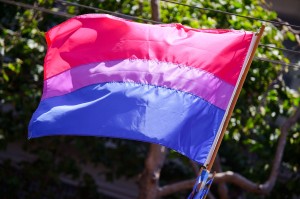bisexual tropes: so sexy it hurts
After revealing that I’m bisexual, I’m often asked three questions: “Do you think it’s a phase?”; “But… who do you prefer?”; and, “Have you and/or will you have a threesome?” (To be fair, this question is usually served with a drink, spilled on my dress.)
Regardless of whether they’re asked by drunk strangers or a close friend, these questions are relentless, and underpinned by a fundamental misunderstanding of what bisexuality is. They mischaracterise me as inauthentic, uncertain, non-committal and promiscuous.
I can’t blame people for this, as they don’t have much to go off. Bisexuality gets little exposure in schools, and when it does appear in mass media, bisexual people are stereotyped into one of three tropes. These tropes work to delegitimise bisexual identities and generate stigma. And nowhere are they clearer than in mainstream film and television.
the phase
Occasionally, when a show’s ratings drop, they call on the trope of the bisexual ‘phase’ to spice things up. Writers take a character (usually female) who previously identified as straight, introduce her to a seductive queer and watch as the pair’s three-episode dalliance generates click bait and upsets conservative media. When shit gets too real, she will come to her senses, find a male life partner and forget the whole thing.
In the controversy of the season, The OC’s Marissa Cooper (Mischa Barton) began what her mother described as a “novelty” relationship with female bartender, Alex (Olivia Wilde). Fox cut their relationship shorter than planned and afterwards, Marissa reunited with ex-boyfriend, Ryan (Ben McKenzie); in later seasons she even jokes about having kissed girls. This treatment prompted the question which the show’s writers are most frequently asked: was it just a phase? Similarly, soon after Sky and Lana shared Neighbours’ first lesbian kiss, Lana left Ramsay Street, and Sky married her southern-cross-starred lover, StingRay. Even Sex and the City’s Samantha spent an episode dating another woman, to the admonishment of her friends:
‘How does that work?’ asks Carrie, ‘You go to bed one night, and you wake up the next morning and “Poof!”, you’re a lesbian?’
‘I don’t think she’s a lesbian, I just think she ran out of men,’ replies Charlotte.
Herein lies the problem with the ‘bisexual for an episode’ trope: once characters return to exclusively dating people of the same/opposite sex, these shows omit any discussion of their potential bisexuality. The effect is to erase bisexuality, representing it as a phase and nothing more, and thereby delegitimising bisexual people.
decide: gay or straight
Underpinning this is the assumption that bisexuals are actually just confused gay or straight people, a stereotype reaffirmed even by queer media. In The L Word, gay characters berate and question their bisexual peers. The openly bisexual Alice is mocked by her lesbian friends for being “indecisive.” Dana asks: ‘Christ, Alice, when are you going to make up your mind between dick and pussy?’
Bisexual characters’ relationships are treated as authenticating or delegitimising their queer status. When Tina leaves her girlfriend Bette for a man, she is treated as having abandoned lesbianism for “straight land.” and questioned for her intentions. ‘When you walk down the street with your boyfriend… enjoying all the heterosexual privileges, you stopped being a lesbian,’ says Jenny. In a similar vein, actress Anna Paquin was recently asked by TV host Larry King if she was now a ‘non-practising’ bisexual since marrying her male partner.
Such representations rush to put bisexual people into one of two dichotomous boxes: gay or straight. Yet, as Paquin described, bisexuality does not transform into homosexuality or heterosexuality with the right partner, like some misfit Pokemon. Nor is bisexuality a mark of confusion; I am happily certain that I like both men and women.
the promiscuous commitment-phobe
The few openly bisexual characters on screens also tend to be hyper-sexualised. Bisexual people, it seems, are so afflicted by ravenous lust that it cannot be contained by heterosexual monogamy.
In the final scene of hit comedy, Dodgeball, the protagonist’s love interest reveals herself as bisexual. After passionately kissing her girlfriend, she turns to the male lead and kisses him too. This kind of sexual flippancy is also a characteristic of Captain Jack Harkness, a bisexual character from sci-fi television series Doctor Who and Torchwood, who even when running from monsters gives a sneaky wink to passers by. 2003’s Anger Management featured two bisexual porn-stars who couldn’t keep their hands and mouths off of each other, even during group therapy. Not only are bisexual characters depicted as sexually attracted to everybody, all of the time; they’re also shown as being unable to control that attraction. To make matters worse, these events are filmed as though they are tools for the sexual pleasure of others; onlookers gawk and suggestive music plays in the background. The hyper sexualisation of these characters works to fetishise bisexual people, and misrepresents bisexuality as a symptom of promiscuity.
Though everyone’s experience will be different, bisexuality itself is none of these things. It is simply having the capacity to feel romantically or sexually attracted to both men and women. Within this category there are diverse individuals whose attitudes and behaviours differ greatly, and who should not be stereotyped, or relentlessly questioned. Doing so prompts us to question ourselves, and to feel a sense of alienation from straight and queer circles alike.
There are certainly more positive depictions of bisexuality in mainstream media than is mentioned here, but these tropes are dominant. Film and television—and perhaps society at large—still has a long way to go.



Pingback: orange is the new black: why are we itching for the third season? | lip magazine